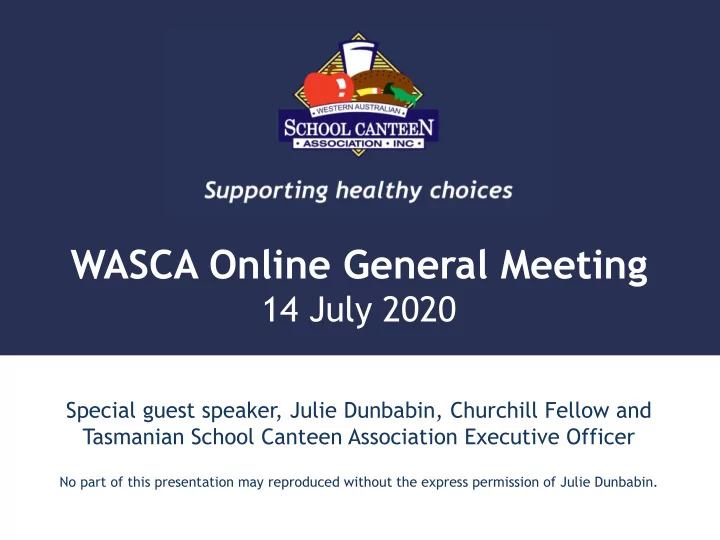

WASCA Online General Meeting 14 July 2020 Special guest speaker, Julie Dunbabin, Churchill Fellow and Tasmanian School Canteen Association Executive Officer No part of this presentation may reproduced without the express permission of Julie Dunbabin.
Julie Dunbabin Churchill Fellow 2018
What did I investigate? “the factors that enable school lunch programs to impact positively on student health and wellbeing”.
Countries visited during my travels – USA, England, Scotland, Finland, Italy, France, Japan 7 October – 20 Dec 2019
Main Findings
Key Findings • All children eat a school prepared lunch • Children sit down to eat – for at least 20 mins • Milk (plain) and water the only drink option • No confectionary options • A skilled workforce who enjoy cooking for children
Key Findings • Proudly using local and seasonal produce • School members and Dietitians involved in menu planning • Diverse food selection – cultural and dietary • Menus and food language based on the five food groups • Infrastructure to prepare and serve food
Dining areas
My very first lunch
Varied lunches from my school visits
Key Recommendations Develop a School Food Plan at Federal and State level. Collection and collation of parent’s and children’s attitudes to the delivery of school lunches to all children and feed this information into the School Food Plan. An Agricultural procurement process established at State and Territory level that accesses local and Australian produce and develops a sense of pride in our farmed food and their communities.
Key Recommendations A commitment from Federal and State Government to fund a School Food Program (including breakfast and lunch) for all students, with parent payment where possible. A shift in focus from nutrient specific assessment of school menus to a robust focus on the five food groups. Cooked school lunches from scratch using local, seasonal and minimally processed foods.
Key Recommendations An appropriately skilled kitchen workforce that are paid for all hours of work and as a result are valued as part of the school team. The school lunch break provides all children with at least 20 minutes sit down time to enjoy their lunch with their peers and teachers. Play time is in addition to eating time. The only drinks offered at school are plain milk and tap water.
Key Recommendations All State and Territories to have a ‘no confectionery’ policy in schools. Continue to embrace and empower our school canteen volunteer culture. Continue the work of connecting food with the teaching of children about food literacy that links to other components of the curriculum, through programs such as Move Well Eat Well (Tasmanian), Stephanie Alexander Kitchen Garden Program and the 24 Carrot Program (Tasmanian).
What have I done since getting back? • Written a report and has been accepted • Presented findings to identified interested parties • Presented findings to state parliament • Secured a small amount of funding to trial school lunches in three schools for a month for a targeted year level (Term 3 & 4 2020)
Thank you Mr Churchill for my opportunity to ‘Bring Knowledge Home”
Contact Details Contact the TSCA on (03) 62 238023 Julie@tascanteenassn.org.au Julie’s mobile: 0418605813 www.tascanteenassn.org.au This TSCA initiative is funded by the Tasmanian Government through the Department of Health and the Department of Education Churchill Fellowship Trust www.churchilltrust.com.au
Recommend
More recommend